Classic Album.
 Japan Gentlemen take Polaroids 1980 Japan Gentlemen take Polaroids 1980
Japan’s fourth album finally saw the group
not only match but supersede their Bowie-Roxy influence. It was the work where
they finally began to sound like themselves and the turning point of their
commercial fortunes in the UK. It was also the album on which Sylvian began to
dominate proceedings. Poised beautifully between their pop sensibility and art
rock future, ‘GTP’ was also the beginning of the end of Japan.
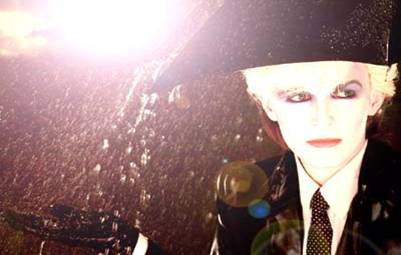
At the time of ‘Gentlemen take Polaroid’s’
release in November 1980, Japan were still considered by much of the UK press
as a Joke. ‘Japan’s current sound is one long, diffuse out-take from Roxy
music’s Flesh and Blood’ summed up the NME’s opinion, a verdict shared by all
the major weeklies.
The group had always worn their influences
on their sleeves ‘Originality is so over rated…’ a 21 year old Sylvian had
quipped a year earlier and Japan were the epitome of a group who had grown up
in public. Their first two albums, ‘Adolescent sex’ and ‘Obscure Alternatives’,
were made when the majority of the group were teenagers. As such they sounded
like the aural equivalent of adolescent photo booth strips ; naïve, misjudged,
gawky, embarrassing and fuelled by misplaced hormones. However, following the
country (life) mile leap of 1979’s ‘Quiet life; ‘…Polaroid's’ was a sudden,
assured and serious statement that reflected both Sylvian’s new found sense of
purpose and the rapid evolution of Japan as self taught musicians. The cover
of the album alone, taken by Stuart McLeod was an instant classic, portraying
Sylvian as a Helmut Newton - esque artifice that channelled Dirk Bogarde from
‘The Nightporter’ via the brand new New Romantic movement.
And although Japan had all the credentials
to fit as forerunners of such a futurist faction, they typically saw themselves
as a cut and style above their perceived peers. Mick Karn : ‘Certain bands
were beginning to be classed together that had little to do with each other,
such as Adam and the Ants, OMD, Spandau Ballet, collectively tied together by
the slender threads of fashion…perhaps I was missing something, I wasn’t
exactly paying attention to current trends’ ‘..Polaroid's’ was also Japan’s
first Album release on the Virgin label, a record company that was perceived
as being as fresh and hip as much as Japan’s old label , Ariola Hansa, were
seen as passé and naff. The move from label to label was far from smooth.
Simon Napier Bell (manager): ‘Peter Meisel (head honcho at Hansa) told me they
were no longer interested in continuing with Japan and would drop them. I went
and talked to Simon Draper at Virgin, and he was very interested. Virgin at
that time were on the verge of going bust. Draper signed Japan, and then Trudi
Meisel, Peter's wife, and co-owner of Hansa, said Peter had had no right to say
the company would drop them, and took legal action against us and Virgin. I
had to find the money for a top-level court case and pay barristers etc, the
group hadn't a penny. The barrister found precedent for word of mouth
termination of contract and Hansa caved in’.
David Sylvian: ‘We knew that unless we
settled out of court, the name we’d built up would be lost and there’d be no
point in coming back. So we had to settle with them (Hansa) and give them a lot
of money, which got rid of the advance from Virgin’.
Most of the band however, not being
particularly business minded and on a Napier-Bell funded wage of £11 per week
were unaware of legal details and difficulties. Still on a high from the
creative peak of their previous album and buoyed by massive success in the
country Japan the mood among the band during the spring and summer of 1980 was
high.
Richard Barbieri (Keyboards): ‘The period
between Hansa and Virgin didn’t feel fractious. We were quite confident and it
didn't seem long before Virgin took us on. They had started to show an interest
in the band because we were selling out residencies at (what was then) the
Music Machine in Camden’.
Rob Dean (Guitarist): The transition from
Hansa to Virgin was not really tense at all. I believe we all thought that at
last here was a label that understood more than just the commercial route.
After all, on Hansa we were stalemates with Boney M & Amii Stewart. When
we signed to Virgin we were label mates with Magazine, XTC and Simple Minds...
And by this point there was a more positive idea as to where the band was
headed artistically and a lot of our favourite musicians and bands of the time
were on Virgin, so it felt right. And as a band we felt quite confident,
bolstered by finally getting some recognition in the UK.’ (The Quiet Life’
album had been their first album to chart in the UK, stalling on its initial
release at a lowly #72).
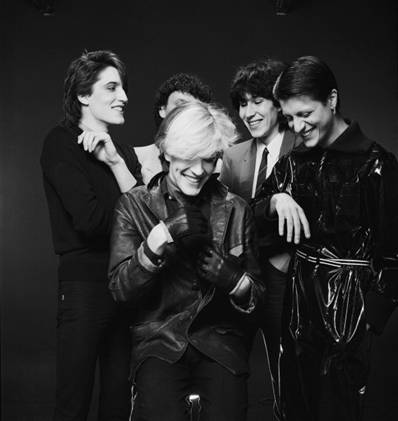
After signing with Virgin in the summer of
’80, Japan were hurried into the George Martin owned Air studios, high above
Oxford Street near Piccadilly Circus.
Barbieri: ‘We’d recorded "Quiet
Life" there and it had been a great experience for us and though it
didn't do that well commercially at the time, we had totally transformed the
sound and musical approach of the band. I think we had our happiest times
during the "Quiet Life" album and we wanted to carry that through
with ‘Polaroid's’.
Dean: ‘I think with GTP we were hoping to
replicate the hugely enjoyable recording experience which was 'Quiet Life’, by
using the same team but in this regard it didn't work. Ultimately I think GTP
would turn out to be a rather a cold, albeit more sophisticated album in
comparison’.
John Punter, a Roxy music and Bryan ferry
solo album veteran, had produced ‘Quiet life’ and was back on board for
‘Polaroid's’. ‘The atmosphere in the studio for GTP was certainly
different to that during Q. Life’ he recalls, ‘There were some tense moments
but we still had fun getting the job done’
The album would take two months to complete
from start to finish – a comparatively rapid process for such a complex and
heavily textured album. With the exception of ‘My New career’ and the Sakamoto
assisted ‘Taking islands in Africa’ most of the songs were already fully worked
out prior to recording. ‘All song arrangements were finalised before we started
recording’. Confirms Punter, ‘and the first thing I’d record was Rich's
sequencer. The rest of the band would play along to that. Multiple takes
would be recorded of each instrument : Bassline, Saxophone, drums, etc and the
master would be edited from different takes. Additional parts were overdubbed
and the vocals done last’. After three albums, Sylvian was gaining in
confidence not only as a vocalist and songwriter but also as an arranger and
producer. More so than ever, by 1980 Sylvian had very definite ideas about how
Japan should be presented, visually and sonically. At the very least he knew
unequivocally how he didn’t want Japan to sound. He viewed their first two
albums as embarrassing ‘mistakes’ and his new found focus would begin to
alienate him from his band mates. (No co-incidence, that one of the newest
songs was entitled ‘My new career’). But by now, the work overshadowed
everything, including friendships. Dean was not explicitly told that he wasn’t
much wanted on the album. He just wasn’t contacted at all for the most part.
‘Weeks went by without him (Dean) at Air’, remembers Karn ‘At every opportunity
for guitar, someone would raise the question ‘Shall we call Rob and tell him to
come in’ Only to be asked not to, not yet…Rob had, in effect been banned from
the sessions…’As for the rest of the band, while their contributions were vital
more than ever, (‘I reckon we’ve got the best rhythm section in Britain’ stated
Sylvian) there was still friction between the old school friends. ‘Disputes
followed between Dave and myself’ Karn in particular would remember. ‘The
saxophone arrangements took days to record, with only Dave hearing anything
wrong with each layered take…in one instance, (assistant engineer) Colin
Fairley sat patiently in the engineers chair recording one word from ‘Methods
of dance’ over and over again for three consecutive days’. Sylvian admitted
this neurotic obsessiveness in himself and also its detrimental effect. ‘I
tend to be too much of a perfectionist. I want everything to be that much in
tune…and you know, I find that limiting in my music…I’ve never really been that
strict about what they should and shouldn’t play. It caused a lot of problems
in the studio, not just with the band but with the producer John Punter. I was
getting involved in the production side of it as well…’.Vocals were the last
‘instrument’ (as Sylvian himself would describe his voice) to be recorded. ‘A
typical vocal session would generally involve Dave and myself working on a
performance’ states Punter, ‘Nothing really special was done in terms of
creating an ambiance, we just got on and did it’.
The resultant sound, built layer by layer
like a watercolour painting rendered in Acrylics and airbrush was polished,
dense, buffed and panoramic. Aurally, there was not a hair out of place. The
same could not be said of it’s personnel. Rob Dean was to bear the brunt of his
band’s new direction. Musically and even aesthetically there was little place
for him in the Japan of the 80’s. His Bolanesque look had fitted in with the
previous decade but he struggled to fit in now either visually or musically.
‘It was true that I found less space to create on GTP’ he affirms, ‘and
although I’m not sure how much I was aware of it, my own creative goals were
drifting apart from the rest of the group, which in turn made it increasingly
difficult to come up with parts that I was happy with. The band was moving more
towards electronic music with YMO,Eno and Kraftwerk as perhaps the strongest
influences and a distorted guitar was feeling more intrusive than complementary
on a fair bit of the material’.

On some of the tracks it’s hard to even identify anything as
sounding like an actual six string. ‘Guitar-wise during this period, the
heaviest influence was Fripp's work which often sounded decidedly
un-guitar-like’ explains Dean, ‘and as a result I used a good deal of e bow,as
I had on 'Quiet Life' but to me this felt quite limiting. I recall trying in
vain to introduce an acoustic guitar part at one point.’ Tellingly, in
retrospect an acoustic guitar would have sounded completely out of place on the
album. Clearly, Dean and Sylvian were no longer on the same page. Sylvian:
‘With Rob, the basic thing was that on Polaroid’s and even ‘Quiet Life’ I felt
I was holding him back 'cause I had specific ideas for the guitar and I kept
imposing them on him all the time…It would take hours in the studio because I'd
be pushing him maybe a little against what he'd want to do.…It came to a peak
on ‘Polaroid's’ as Rob only played on about four tracks…’.
The early 80’s UK pop music scene (as in
popular) would be notoriously anti- Guitar, e-bowed or not and Dean now
struggled to find any footing in a group he’d been a member of since the mid
70’s. ‘But I’m not sure how much pressure I felt coming from Dave’ he argues.
‘I think the pressure was all mine. Robert Fripp was an influence because he
had transported the guitar into the '80's in a way which was staggeringly
inventive and really it was hard to even come close. I grew up with the
influences of the melodic artistry of the Beatles, the folk-tinged work of
Fairport Convention and the sheer power of bands like Cream. I was not
particularly fond of Fripp's work in King Crimson up to this point but the
contributions he made to the work of Peter Gabriel and Bowie just floored me.
But ultimately I didn't really want to emulate anyone. To be honest I wasn't
entirely in love with the direction Japan was moving into and so naturally it
became a struggle’.
‘Polaroid's’, while pivotal, would prove to
be Japan’s tensest album so far. Involved in every aspect of the album from
the song writing to the artwork, the singer would often introduce a cover
version into proceedings solely to alleviate Sylvian dominated sessions, (See
‘Ain’t that peculiar’ and ‘All tomorrow’s parties’) but when the atmosphere got
fatally heavy, there was always the pub.
Japan were not clubbers or pubbers by
nature but the combination of work stress and their fondness for their
gregarious producer (who now runs his own pub in Canada) and the centrally
located Air resulted in the unlikely scenario of the quintet hanging out at the
local ale-house. ‘Because John Punter was so well-liked’ recalls Dean, ‘and we
had bonded with him so strongly, the notion of us visiting the local seemed
more acceptable. Also, over the time we had recorded at Air we had made friends
with several of the staff and so it seemed logical to pop down the pub to relieve
some of the stress. In our time with John both on and off the road it was
fairly normal to be in a bar somewhere laughing and joking and David was no
exception, although I wouldn't say that he particularly would be as relaxed as
the rest of us. He was always very aware of his public
persona’. Barbieri: ‘… there was the local pub, where you would share a
beer and a chat with John Cale for instance- and yes; we even got David to that
pub once or twice!’ Previously, Japan had attracted much hostile attention in
public due to their made up appearance but now, compared to the Steve Stranges,
Marylin's and Boy Georges of London they were hardly noticed. ‘Rarely would
there be any negative comments by this time’ says Dean, ‘I believe that our
appearance was actually rather sober in comparison to what was currently around
us’.
Even the studio itself was more of a
social hub than most. ‘With the set up at Air it would have been very difficult
not to interact socially with other musicians’, confirms Barbieri. ‘Invariably
there would be conversations upstairs in the cafeteria at any hour and one
would always be chatting to folk in the foyer or along the corridors.
Occasionally this would result in invited 'listening parties’. Dean: ‘Studio
time was never entirely exclusive; it wasn’t a ‘closed set’ as it were, other
than when vocals were being recorded… I think it occasionally helped lighten
the intensity of the recording process when we had visitors. The record company
would drop in from time to time, including Mr Branson himself on one or two
occasions’.
Across the hall from Japan, Duran Duran
were recording their first album. Huge fans of Japan, there was some brief
interaction between the two groups, with a member of the former apparently
telling Barbieri; ‘We’ll be bigger than you because we want it more”. Japan’s
more reserved keyboardist was happy to concur with this proclamation but while
amused, Japan were less taken with Duran than Duran were with Japan. Karn :
‘(Previous to meeting at AIR) Rich and I got a cassette from a band who wanted
us to produce their album, and it was a band called Duran Duran who we’d never
heard of. We listened to the tape and there was this track “Girls on Film” and
we thought, “God! What a load of rubbish! This is terrible! We don’t want
anything to do with that lot.” So we wrote back and said “Sorry” – we found
that it sounded so similar to us that they wanted us ‘coz of who we were and
not that they thought we could do anything good with it.’ Duran Duran survived
this snub and went on to be a short lived obscure art house band who were
briefly big in Taiwan.
Barbieri: ‘You couldn't help but mix with
other groups really. It was quite incredible working in such a small building
with all these artists making their albums. Whilst making ‘Quiet life’ Kate
Bush came into our studio, sat crossed legged on the floor and listened through
to our tracks (‘Despair’). Paul McCartney had studio 2 on almost constant
hold. He asked if we needed any guitar on our album. He and Linda were very
nice people. We also met Michael Jackson. That was… weird’.
Punter: There was always some socializing
at Air, mostly with Paul and Linda McCartney as Linda was a huge fan of the
band’.
Outside of the studio and their private
lives, Japan were concerned with presenting a very un -rock and roll image to
the public. For instance Sylvian, then a chain smoker, would never deign to
appear on stage with a glass of water, let alone a single cigarette. Yet this
was the 80’s, and sometimes if only in order to put in extra time at the
studio, like everyone else in the music industry, Japan indulged in nefarious
substances from time to time. ‘I think coke entered everyone's lives in those
days’ says Barbieri, ‘Not just the artists either. But Steve never indulged. A
wise decision!’ 12 hour days were the norm, and if the group had more stamina
than their producer, they could carry on with a ‘night shift’ engineer, with or
without the aid of substances. Karn :‘You know the old idea that cocaine goes
hand-in-hand with being a musician and working late at night? I don’t think
that’s true at all. I think you lose your sense of judgement completely’.
Dean: ‘It was an extremely insular group, but I wouldn't call it a particularly
sober one. It was a very close unit socially and it was rare that any outsider
could penetrate that, but there was a good deal of fun and laughter, a side
that the public rarely if ever got to see. In particular, Mick and Steve could
be very entertaining when on good form’.
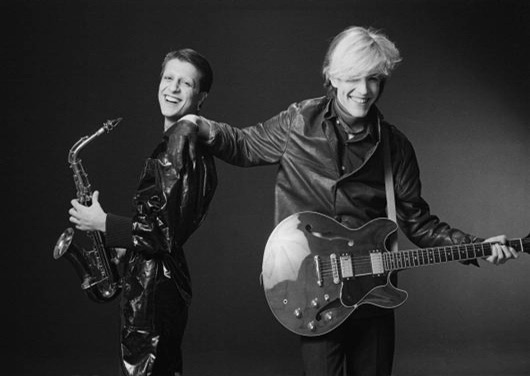
Sylvian, perhaps in part inspired by an
admiration for Talking heads, whom he had recently caught live in a small club
in Tokyo, was also becoming more interested in bringing in outside musicians to
contribute to the Japan sessions. Among them Hawkwind and Bowie Violinist for
hire, Simon House. (Endearingly, Sylvian had attempted to teach himself violin
that summer but soon abandoned the instrument). ‘I find that more and more
interesting, actually, to work with other people…’ he commented, ‘it was really
nice to get outside people working with us, to get their reaction to what we’re
doing’. The irony of this must surely not have been lost upon Dean, who
nevertheless, according to Karn ‘Never complained about anything’. Not that
Sylvian would have heard anyway. ‘I isolate myself from everyone in the studio’
he claimed, intensifying the image of himself as the sole solitary maverick
purist of the group. Halfway through the sessions, the situation was judged to
be so tense that a change of environment was needed. Japan and Punter
consequently relocated to The Townhouse, in Goldhawk road. ‘I was going
through many musical changes’ explained Sylvian. ‘I wanted to get away from
‘Quiet life’ but still felt very attached to it… unusual for me…things were
getting very strained halfway through ‘Polaroid's’. We had to take a break…I
wrote on keyboards instead of guitar which caused difficulties’. Dean confirms
that ‘The working process for GTP was somewhat different to the albums that
preceded it, in that some of the material was created and constructed in the
studio rather than in rehearsal, and David was probably more in charge than
before. He wanted to move further away from the obvious Roxy Music influence
which pervaded his writing on 'Quiet Life’, but ultimately I don't really think
he succeeded. It may be that GTP was created a year too soon’.
Japan were left to their own devices in the
studio with neither record company or manager dictating any concession to
commercialism. Although still only in his early twenties, Sylvian had a surer
sense of himself and his work than ever before. This would not lend itself to
the constraints of a band set up for much longer. No one knew it then, but
Japan would split up less than 18 months later. For now there was work to be done.
Dates were booked to help promote the album and Virgin launched an inventive ad
campaign that got the album just outside the top 40. Even as the group were
starting to show cracks, they were finally on the way to real success.
‘By the time the album was mastered’
remember Napier-Bell, ‘Dean was no longer a bona fide member of the band. His
leaving seemed an eventual inevitable situation. He came from North London, all
of them from South. But he'd fitted in pretty well and even adapted himself to
wearing make-up off stage and all the other things David required of them. His
leaving was obviously the beginning of the end of the Japan we'd worked so long
to break’.
Sylvian : ‘I don’t think it’s the best
thing we’ve done…It was a very hard album to make because there was a lot of
strain in the studio…feeling between members of the band wasn’t too good,
because I was putting limitations on them, because I was after a certain
sound. I’ve never done that before… I'm happy with how it sounds – the thing
is that I was growing out of it before we'd finished it; we worked on it for
too long. I'd already begun to pull away from ‘muzak’.’ Napier-Bell:’ I don’t
consider it necessary to be a fan of the music the group made. I came to like
it, but was not its biggest fan. But I was a fan of the group. I loved them -
the best bunch of people I ever managed - sharp, funny, intelligent and very
good to be with’.
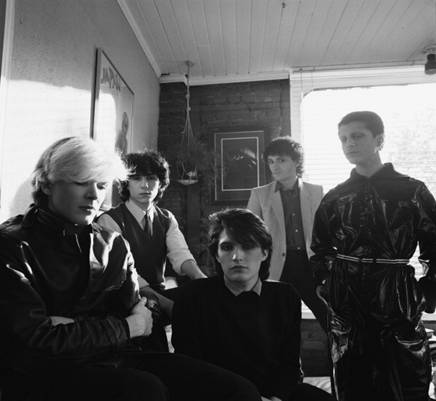
Gentlemen take Polaroid's’ would be mixed,
mastered and packaged as quickly as possible, with Virgin rushing to meet the
Christmas market. Released that November, it was Japan’s biggest hit in the UK
to date, although it would take another six years before it went Gold. It
would spawn no bona fide hit singles but was hugely influential and more
importantly it set Japan up for their one real masterpiece, ‘Tin Drum’,
released almost exactly a year later. While the ‘serious’ press remained for
the time being unconvinced by the band it also bagged Japan their first Smash
Hits cover. Rob Dean would never record with the band again and the very first
seeds of Sylvian’s solo career had been sown.

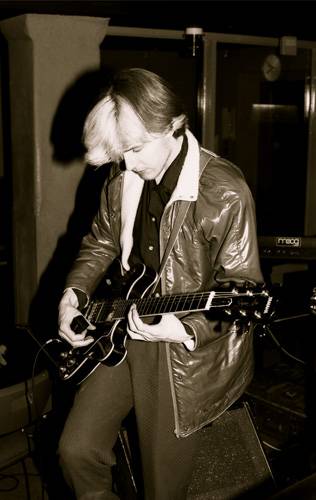
 The tracks : The tracks :
"Gentlemen Take Polaroid’s"
The album’s title track and the first
single released on Virgin, ‘GTP’ was both complex and catchy. The group’s
first decent promo Video was made to accompany it (and was never shown on UK
TV). Although it only reached number 60 in the Gallup UK singles chart, it was
a favourite among club DJs. Nick Rhodes played it regularly as part of his DJ
Set at the Rum Runner. In London, Rusty Egan included it as part of his Blitz
set. Gary Numan was instantly smitten, eventually working with Karn on his
‘Dance’ album and even naming one of the Chapter’s in his autobiography after
it. The opening line of this song is among the most traditional Sylvian ever
sung: ‘Now there’s a girl about town/I’d like to know’. This same girl
(presumably) would be referenced throughout the Album on ‘Swing’, ‘methods of
Dance’ and most explicitly on ‘Nightporter’ and ‘some kind of fool’ making
‘GTP’ Japan’s most obviously romantic album. Sylvian, having worked on the
track alone at home initially presented it to the band at their grotty
rehearsal rooms in Willesden. (The group would soon relocate to the Napier Bell
owned Nomis complex in Sheppard’s Bush) Barbieri : This song started from a
sole keyboard line from David. The finished track starts off with my keyboard
melody and Steve on drums. After the intro fill then you are into David's
keyboard line and the 1st verse. The chorus is obviously David's creation with
a strong melody and vocal line. After that chorus there is a breakdown where
it's just my keyboard parts and Mick playing oboe on top; then back into the
body of the song. Likewise, after the last chorus it all breaks down into
drones and electronics with synth sequences on top. David sings various harmony
lines over this until the coda’.
Dean: ‘From Q. Life onward, Dave’s songs
were usually played to us as a rudimentary keyboard idea. A few songs David
worked on together with Rich at home and then presented them to us in rehearsal
where we would flesh them out. I seem to recall that we worked fairly solidly
on the title track before the recordings at Air began, more so than most of the
rest’.
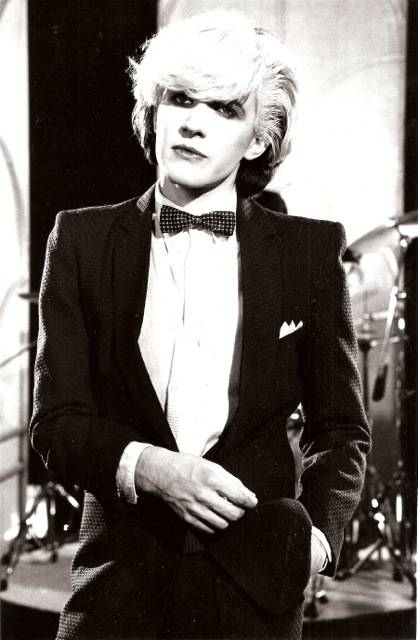
"Swing"
Among Japan’s sexiest songs, this was
performed during their first UK TV appearance via the ‘Old Grey Whistle test’.
Jansen’s cool, tight drum pattern plays what is almost a counter melody over a
Bossa nova Korg rhythm -box beat, topped off deliciously by some of the best
sounding finger clicks ever.
Barbieri: ‘About 4 or 5 of us made this
finger click overdub as one take. It was definitely David, Steve and John
Punter. I guess a good microphone well positioned and the right combination of
clicks did the job. John was always keen to add "percussive extras"
like finger snaps, hand claps, tambourine etc... He had some sense of timing
and it was always enjoyable for us to watch him record an overdub as we'd tease
him relentlessly about it: Now I'm not saying that this was John Punter's incentive
for percussion overdubs, but in those days many Producers would play little
extras like triangles, claps etc on tracks because they then became one of the
"performers" and as such earned an equal % of the performance
royalty. We were totally unaware of this at the time’. Although denied airplay
the track was again picked up by club DJ’s and featured on various ‘Club’ and
regional charts.
This was one of the few songs where the
marginalized Rob Dean fitted in on the record. Dean: I think ‘Swing's’ epic
structure is well honed and entirely successful and I’m satisfied that my
contributions complement the whole. It sounds confident’.
"Burning Bridges"
The cousin of Bowie’s ‘Neukolns’ and ‘Sense
of doubt’ with added crooning on top.
Performed solely by Sylvian with the
exception of Barbieri’s contribution to the intro and Karn’s Saxophone. The
atmosphere of this piece was based on the John Hershey book ‘Hiroshima’, which
Steve had passed onto Sylvian. This song replaced the much more traditional
sounding ‘Some Kind of Fool’, which was ditched at the last minute resulting in
some sleeves of GTP having Stickers listing ‘Burning bridges’ over ‘Some kind
of fool. This also resulted in the album going out without a credit sheet,
causing some magazines to criticize Japan for crediting their hairdressers at
the expense of the musicians. An ‘alternative’ version of ‘Burning bridges’
appeared on the GTP double single credited as being produced by Sylvian only
but the differences between the two are negligible. Never played live, although
used as an intro tape on Japan’s final tour.
"My New Career"
Sylvian was a frequent cinema goer but
watched TV Sparingly. ‘I try to use TV only to watch films’ he once said, ‘but
you have to be careful or you can easily end up watching any old rubbish’. He
may or may not have seen ‘My brilliant career’, a movie released to art house
cinemas in 1979. But he would have definitely heard Bowie’s ‘A new career in a
new town’. Whatever its conception, this song was one of the few to be
composed completely in the studio and was rarely played live, bar the
aforementioned appearance on ‘Old grey whistle test’. Like many of the more
up-tempo songs on GTP, karn’s bass is a sinuous delight; a sensuous, rubbery
counter melody weaving lushly through the entire song.
Karn: ‘… (It) took us one day to write in
the studio. I much preferred it to another ballad…’
Methods of Dance
This was definitely a result of Sylvian’s
late night Kensington TV habits, based on a BBC documentary of dance choreographers
working in New York. Lyrically it references Bowie and Roxy explicitly : ‘Then
out of the blue…’ sings Sylvian on the Chorus, going on to quote Bowie in the
verses with ‘Sense the doubt’ and ‘Speed of life’…etc. Musically the influence
came from further east.
Dean: ‘if there was any direct reference
for GTP’, it was YMO’s ‘Solid state survivor’. The influence of YMO on 'Methods
of Dance' is clearly evident but the percussive elements in particular take it
a step further. I think both tracks represent the band as a unit at it's
strongest during that period’.
"Ain't That Peculiar”.
Sylvian maintained that albums were a
scarce commodity in his household when growing up, name checking Rodgers and
Hart musicals, Flight of the Bumblebee and his older sister’s Motown collection
as his earliest musical memories. Along with ‘I second that emotion’ this would
be Japan’s second Motown cover.
Barbieri : ‘This reflected David's
listening tastes, I guess. Not mine. I was never into Tamla, but it was nice
working the electronics into these songs’.
Japan’s version of the Marvin Gaye standard
is more an inversion, taking the song apart and rebuilding it via an
indecipherable code On first hearing it sounds like its being played
sideways. Sylvian : ‘…(our) rhythm section are very adaptable, they’ve got
such a characteristic style that whatever they play immediately becomes Japan’.
Motown founder Berry Gordon and Marvin
Gaye’s reactions are sadly not on record.
Barbieri : ‘If they did hear our version,
I'd bet they would've been pretty shocked. It's an interesting interpretation.
It was never apparent to me where the one in the bar fell. Steve created
really inventive percussion parts. I think it's the strangest track on the
album’.
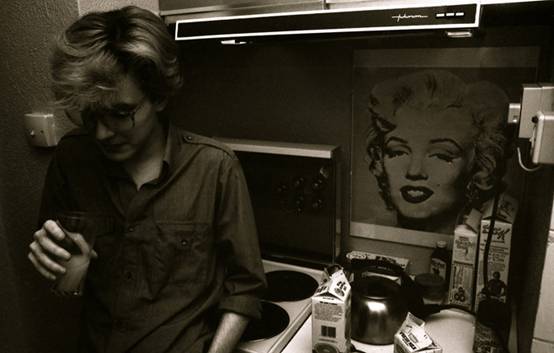
"Nightporter"
Sylvian admired Dirk Bogarde’s later work
(the art house explorations of ‘Providence’ and ‘Despair’ in particular) and
has acknowledged that the atmosphere of this song (and Q. Life’s ‘Despair’) was
based on the Bogarde film of the same name even if musically it was a ‘Homage’
to Erik Satie. As with ‘Burning bridges’, Sylvian once again took an
instrumental idea and added lyrics and melody to great effect.
"Definitely’, said Sylvian of the influence, ‘I was influenced an awful
lot by Satie, but I've milked him dry after 'Nightporter'. People like Satie
and Warhol influenced me a lot, but I don't really like their art that much,
just the ideas behind it. I adopt their ideas and apply it to my work’.
Unusually, both Sylvian and Barbieri would
tackle the simple piano part in tandem.
‘I think it was just a case of one of us
playing the chordal and bass parts and the other playing the top lines.’ Says
Barbieri. ‘We may have recorded that together as one take. There was always a
rush for the piano and often two people playing at once’.
Barry Guy was a session musician who
contributed string bass to the track : ‘I remember nothing about the session’
he recalls ‘other than they had great barnets.’
released as a single to coincide with
Japan’s final tour in late 1982, the song managed to make the top 30,
accompanied by a simple promo video that again, was never shown in the UK.
"Taking Islands in Africa".
With a title taken from a book of
Photographs Sylvian had chanced across, ‘The lyrics are based upon images I
pick up from books, travel and the people I work with, they don’t really say
anything’, the actual music was composed built around a rhythm track that
Sakamoto (who was recording with YMO in another studio at Air) came up with.
The classically trained pianist wrote the basic parts on a sole Polysynth in
the studio, with overdubs added by some of the band added later.
Dean: 'Taking Islands in Africa' began with
allowing Ryuichi Sakamoto to create a piece from scratch and layering assorted
parts in the studio over a few hours, which was a fascinating experience as a
bystander’.
Karn : ‘(Sakamoto) could turn the pages of
his sheet music, smoke, doodle, dial phone numbers, juggle, prepare and eat
lunch with one hand while recording the keyboard parts…’ Sakamoto : ‘…it
sounded very different to the rest of the material, rather unlike Japan…’.
Punter : Working with Sakamoto was interesting and sometimes difficult.
He's a very intense personality and the language barrier sometimes did not
help’.
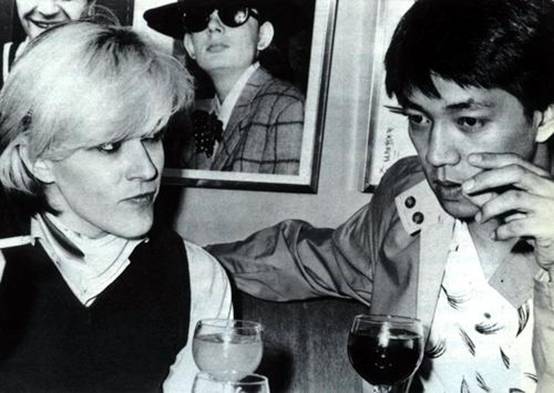
 The missing track : The missing track :
Some Kind of fool
A gorgeous, lilting Torch song, closer to
one of the standards that Ferry had recorded on ‘These foolish things’ than
anything by Roxy. The song was completed but ditched at the last possible
minute. Napier-Bell: ‘Usually, if anyone came into the studio and said what
Japan were recording sounded like a hit, David immediately stopped working on
it. He was afraid of producing anything that sounded crassly commercial. So we
all had to learn - If something sounded like a hit, for God's sake say nothing,
or perhaps tell him it sounded a bit 'obscure' or 'difficult'. Then he'd go one
with it.’ Barbieri : ‘I found the vocals rather derivative. It was basically
Roxy's "Song for Europe" complete with French vocals as well’. Dean:
‘The main problem with this song at the time was that David questioned strongly
whether it was far removed enough from the material on 'Quiet Life’,
particularly with the notion of adding strings. He felt it was too close in
structure to 'The Other Side of Life’. There was also another song, 'Angel in
Furs' which we rehearsed but which ultimately also fell by the wayside’.
‘Some kind of fool’ was slated by Virgin
for a December ’82 release, as a version by French Chanson Pierre Barouh’ but
this never happened. It was finally released in a different form in 2001 as
part of a Solo Sylvian retrospective.
 Q&A Richard Barbieri. Q&A Richard Barbieri.
How do the instrumentals 'The experience of
swimming', 'Width of a room' and 'Life without buildings' – all recorded around
the same time as the GTP sessions but released as B-sides - come about?
RB : Experience of Swimming, Width of a
Room were recorded during the Polaroid's sessions and used to enhance the GTP
EP / Single and were later featured on remastered versions of the album. I
already had the basis for the ‘The experience of swimming’ written and just
allocated myself some time in the studio on my own. I recorded it all in the
small studio 3 at Air with my gear set up behind the mixing desk. Mick played
some oboe in the middle section. I wasn't present for "Width", which
was Rob’s piece. Dave titled my track.” Buildings" was recorded between
GTP and Tin Drum’. It was built around David's main keyboard melody, but there
are 3 other sections where this part has no presence and other parts make up
the composition / arrangement. This was the case on many Japan tracks, but the
publishing credit was always 100% Sylvian.
It seems to me that from ‘Quiet Life’
onwards the band were very particular about which producers they worked with.
Was this a struggle? Did other people - Label- management – have other ideas…
Were the band unified in their choices?
RB :There was obviously a conscious
decision to go the "Roxy Music" route. Probably instigated by David
but of course with total agreement from the rest of us ( We were all Roxy
fans). John Punter had produced Roxy's "Country Life" and engineered
on the earlier albums as well as Ferry’s solo material. Our first choice at
the time may have been Chris Thomas. Our engineers of choice were also Roxy
affiliated. Steve Nye was another Roxy engineer and also part of the Penguin
Cafe Orchestra. A great musician and producer. Probably the only time we went
with someone else's decision on a producer was with Giorgio Moroder. (for the
‘Life in Tokyo’ single). The objective was presumably to write and produce a
hit.
As a group, were you very vocal about
praising each other’s playing?
RB : It was great seeing Mick and Steve
work together. I wouldn't say they ever had "chops" but they just
played these unique parts. So original… Of course, we had respect for each
other and we afforded each other space to express that. By the time of GTP we
were kind of expecting everyone to come up with good ideas, so it may have
seemed a cooler response to an outsider.
Were you satisfied with the equipment you
were afforded? Or were some things out of budget? Both Kate bush
and Peter Gabriel had both started using early samplers at this point - were
these beyond your budget or were you not sufficiently interested in this kind
of technology then?
RB : We had a lot of gear at our disposal
if we wanted - if only on hire - but really I'd say we worked best when there
were limitations. Tin Drum features just three synths and for the most part
just two. Less is often more.
We already were experimenting with voice
and instrument samples in a way, usually with a cassette machine running
through or triggered by the synthesizers. This was about £20,000 cheaper than
a Fairlight.
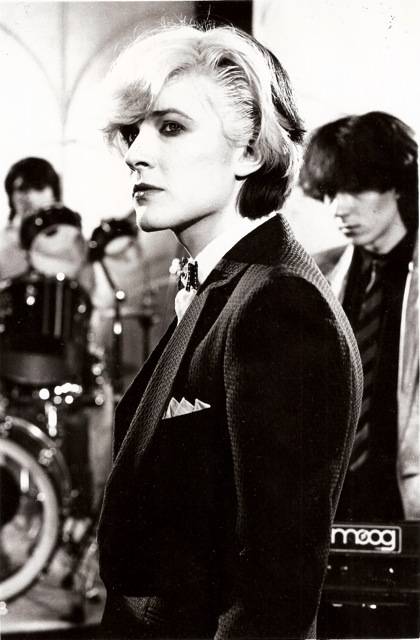
Was any consideration ever given to playing
the songs live or did you think exclusively in terms of the record?
RB : The recording was the only
consideration. How to play it live was something we dealt with when the album
was finished.
What’s your most vivid memory of Making
GTP?
John Punter doing a mix. It was a hilarious
process. In those days there was no recall on the desks or flying faders so the
mix had to be done manually with all hands to the deck, so to speak. All the
level changes, external FX sends and mutes had to be done manually.
He liked to take this job on solo even
though we, or others, could assist. So we would watch from the sofa behind him
as he wheeled himself in his chair from one side of the desk to the other in a
Basil Fawlty manner working up a sweat at the controls like a man possessed.
Do you ever listen to Japan?
RB : Occasionally. Quite a few people write
to my web site asking technical questions about the recordings, so I'll have a
listen to refresh what memory I still have. Do I sit down and listen to them
regularly ? No.
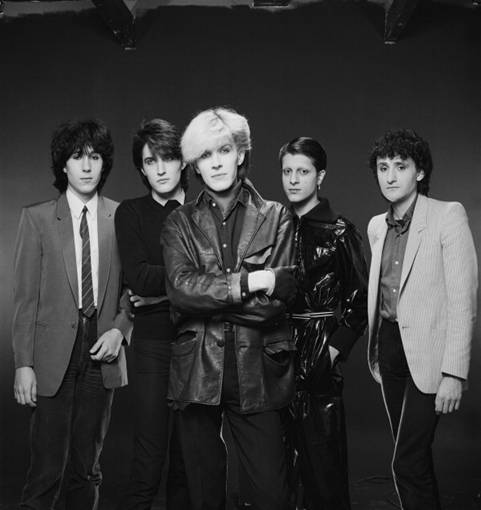
PHOTOGRAPHY : Nicola Tyson, Steve Jansen
and Fin Costello.
Japanese interview with Sylvian Circa GTP :
'I've changed
dramatically...'
David Sylvian
Interviewer : Kim Yamakado/Music Life
reporter in London
Releasing the
album ‘Gentlemen Take Polaroids’, the band was preparing for their third visit
to Japan. David, at the time, seemed disillusioned with concert tours. He tells
us that he would reconsider the future after the Japan tour.
(Music Life,
January, 1981)
 'Producing ‘Gentlemen Take Polaroids’ was an ordeal' 'Producing ‘Gentlemen Take Polaroids’ was an ordeal'
Kim: At last I got
the new album yesterday. At the very last minute, really. The last song which
was composed by Ryuichi Sakamoto (Taking Islands in Africa) is very nice. In
the last interview, you or Richard was saying that you had no idea whether or
not the song had a Japanese taste. In fact, I don’t hear any Japanese infulence
in the song.
David: No, it doesn’t have it, does it?
Kim: I think it’s
indistinctive.
David: I think the music reflects lots of
Ryuichi’s characteristics, so some people might find it Japanese.
Kim: The title
says ‘Africa’ but it’s not even African, is it?
David: Yes it is, I think. Just a little bit,
though. The rhythm or the African drums… we used those instruments in order to
add a bit of African taste to the song. But it’s not obvious, its very subtle.
Kim: Did you
listen to the album after completing the recording?
David: No, not as much as I did ‘Quiet Life’ or
‘Obscure Alternatives’. It took me so long to make it so I’d already taken the
next step forward before the album was completed. If John (Punter) hadn’t been
there with us, I don’t think I would have completed the album.
Kim: Why?
David: Because…. it’s difficult to explain but…
(thinking deeply) there were quite a lot of disagreements about our opinions
when we were in the studio. It was me who decided everything and I was always
imposing on the other members. So by the time of mixing I had already lost
interest…
Kim: How do you
mean by disagreements? Can you tell me more precisely about it if you don’t
mind… Did you have a problem in musical perspectives?
David: Musically too, yes. I wrote songs in the
studio and was about to arrange them all on my own. Usually, I have my
original ideas about how the sounds should be and I do it in the studio or
rehearsal. At such times the members perform according to my direction. Most of
the time I let them do whatever they wanted, but as for this album, I didn’t
give them much freedom. I tried to adopt my own idea to each song as much as
possible. That surely caused problems, especially between me and Mick.
Difficult problems came up between me and John too.
John didn’t understand what I was doing or what direction the album was heading
for. He was just sitting on the backseat and wasn’t producing, so to speak. So
I had a clash with him as well.
Kim: What did you
do then?
David: I was struggling hard to complete the
album. ‘Gentlemen Take Polaroids’ is definitely not an easy-listening album.
Unlike ‘Quiet Life’, it’s not what you want to hear all the time. As a matter
of fact, the album works in its way though. I had to complete ‘Gentlemen Take
Polaroids’ for my own sake. Had I not finished the album, I would be feeling
like I was deceiving myself. So I pushed myself to do it. (clearly) It’s
nothing to do with outside pressure that I had to finish it. Anyway, I always
think that it would have been better if I had been more patient.
 'Simple
words tell more' 'Simple
words tell more'
Kim: You said that
this time you took a different style by ‘writing songs in the studio’…
David: We prepared 4 songs prior to going to the
studio. But as soon as we got in there I omitted one song. I didn’t think it
was suitable for the theme of the album. And by the end of the recording I did
another one. So some of the songs I wrote in the studio. It was such a dramatic
experience for me.
It’s really hard to write songs. It really is. That’s
why, at the moment, I’m finding it very difficult to talk about the album from
an objective point of view. It’s hard for me to say if I like this album or
not. My favourites are ‘My New Career’ and ‘Taking Islands in Africa’, just
those 2 songs, though.
Kim: Lyrically, I
think it’s become more personal compared to ‘Obscure Alternatives’ or ‘Quiet
Life’…
David: It’s been that way since ‘Quiet Life’.
When I was making ‘Quiet Life’ I was clearly feeling so and in fact it was the
first time that I’d reflected myself in the album. I mean, I saw myself from a
subjective point of view.
Kim: When Japan
made their debut, people used to say that your lyrics were rather intellectual,
like a young intellectual using intelligent words. But now it seems to me that
you tell more by using simple words?
David: In ‘Quiet Life’ I tried to simplify the
lyrics and the same thing goes to ‘Gentlemen Take Polaroids’. By simplifying
words they tell more, I think.
Kim: I have a
feeling that the lyrics partly don’t fit the sounds in the background. I don’t
mean to say that they don’t get on well sensuously. For example, some very
simple words such as ‘Make’ or ‘Take’, you pronounce those individual words in
an unnecessarily extended manner…
David: Ah, I did so simply because I thought the
way I pronounce each word would fit the melody of the songs. I regard my vocal
as a musical instrument and therefore, apply the vowel sounds of words.
 Dramatic
‘change’ that happened to me Dramatic
‘change’ that happened to me
Kim: It’s already
scheduled that you’re going to Japan in February. You’ll have to play in front
of your fans as a member of the band. When I think about your feelings now,
I’ve no idea how you’ll respond to that.
David: I personally don’t want to do it. I don’t
want to do tours. I want to quit it now. But there’s nothing I can do about it…
To do this tour, it’s nothing but self-discipline. I decided whether or not we
should do a tour when the album was completed. It would be too pathetic if I
didn’t do it because it took me for such a long time to make this album.
Wherever we come to an end, not trying to follow up what we’ve done so far was
out of the question, I thought. The follow-up on this album is the Japan
tour. When the tour’s done and whatever we do afterwards, it’s time I should
bail out. If I withdraw myself from backing up ‘Gentlemen Take Polaroids’ now,
I’m just a weak-minded guy, I must say.
Kim: You have to
do what you’re supposed to do. That’s your self-discipline.
David: Yes. But one thing’s for sure is that (in
a louder voice) I’ve never enjoyed tours. I’ll do it if people want to
see our concerts. The other 4 members like tours. They really do, especially
Steve and Mick. But I don’t. It’s only me who feel that way.
Kim: Isn’t it hard
for you? They enjoy tours but you don’t. I wonder if you feel alienated among
the rest of Japan?
David: Yes… (silent).
Kim: You couldn’t
say to them, for example, ‘You go anywhere you like but I’d rather stay in my
room’ once you arrive in Japan. I thought your life styles and things were very
similar to each other so it’s a little bit odd to hear that.
David: I may be giving you a wrong impression on
us. I mean, we’re changing at the moment. I’ve said earlier that we’re coming
to a turning point and as far as I’m concerned, a dramatic change has already
happened to me. I think a similar thing might have happened to the other
members too, or it’ll happen to them in the future. In their cases, however, it
wouldn’t be as striking as mine.
Anyway, we are
coming to an end of a period. I don’t know what’s going on from this point on.
Kim: You’ll see
how it goes.
David: That’s right.
Kim: You’re having
a bit of rest as you’ve completed the album?
David: It’s time for me to do some meditation.
(smiling).
Kim: Any plan for
a tour in the UK?
David: I think we’re having a concert at Lyceum
Theatre on 27th November. I can’t stand tours but we may tour Europe
in December.
Kim: Thank you for
coming today.
Translated by
Yuko Nakamura
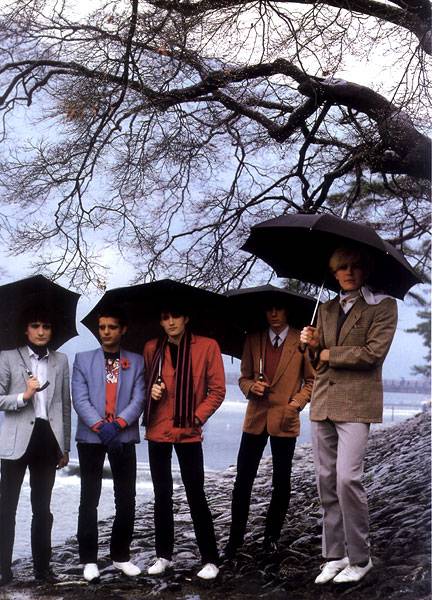
Artist Nicola Tyson was a budding
photographer who worked with the group at the time. She took the Picture that
appears on the album's reverse.
Tyson : I worked closely with Japan during
that period and have a lot of photos, albeit in a rather disorganised archive.
I even still have the Anthony Price black jacket David Sylvian is wearing on
the cover of Gentlemen Take Poloroids that he gave to me back then. I have not
been in contact with any of them since that time however, and was sad to hear
only recently that Mick Karn had actually died. He was a nice guy -they were
all 'gentlemen' actually, as I remember it. The refinement wasn't a pose'.
You know, that ripped leather jacket David
is wearing in many of those photos I swapped with him for either the Anthony
Price jacket or his Etams (girls) mid length black coat, that I subsequently
wore to death. I will have to try and remember how that exchange worked. It was
on the set of GTP. I was wearing the brown leather jacket that he then donned
spontaneously for 'Swing'. But it wasn't strictly mine to give away... I'd
borrowed it!
Who I borrowed the leather jacket from was
Steve Chivers (my partner at that time) who assisted me on the GTP shoot, but
they spelt his name wrong on the album cover (Shivers) not that he cared much,
as he wasn't into them, just me!
We did that photo (on the back of the
album) on the roof of Air Studios above Oxford Circus. It was going fine (I
have all the rest of the shoot) until the police appeared on the roof and told
us to stop, as the powerful flash going off was distracting traffic below or
something!
The single cover was done upstairs in the
Duke of Argyll pub across the street'.

|

